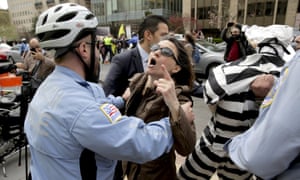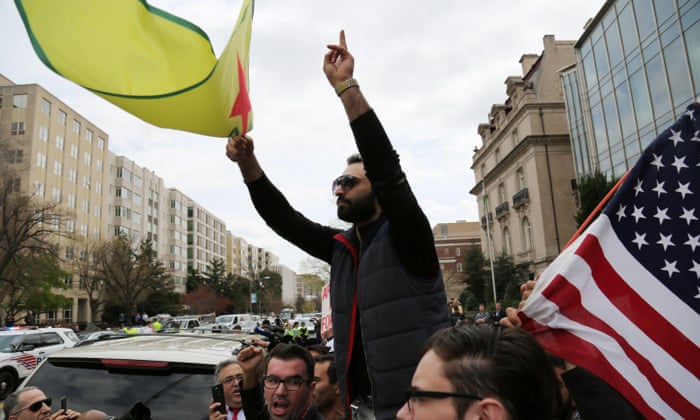Reporters covering a speech by Turkish president Recep Tayyip Erdoğan in
Washington DC say they were excluded and physically attacked
 |
| A Metropolitan police officer separates a protester from a member of the Turkish security detail in front of the Brookings Institute in Washington on Thursday. Photograph: Joshua Roberts/Reuters |
A source close to the event at the Brookings Institution told the Guardian that it was close to canceling the president’s appearance until the Turkish embassy intervened and persuaded the bodyguards to back down.
The fracas in the heart of the US capital made for a rocky start for Erdoğan, who stands accused of cracking down on freedom of the press in Turkey, as he attends a nuclear security summit hosted by Barack Obama.
Adem Arslan, 42, a journalist at the newly launched liberal daily Özgür Düşünce, said he had pre-registered to attend the speech and was in the lobby speaking to Brookings’ foreign policy communications director, Gail Chalef. “While we were talking, Erdoğan’s guy came over and threatened me and tried to kick me out,” he recalled.
“Gail told them, ‘He’s a journalist and we invited him’. Erdoğan’s guards said they didn’t care and verbally and physically attacked me. They grabbed me and pushed me out of the building and forced me across the street.”
Arslan claims he was further harassed, but eventually Brookings staff told him he would be allowed into an overflow room. But even then, he said, Erdoğan’s bodyguards attempted to remove him for a second time, only to be blocked by an American security officer who offered him protection.
“They accosted me with bad language. One of them said, ‘We are going to kill you because you are a traitor.’ They think I am a CIA agent because I am not a supporter of Erdoğan,” Arslan said.
The Associated Press reported that Arslan has worked at outlets linked to the US-based Muslim cleric Fethullah Gülen, a former ally turned rival of Erdoğan. The Turkish government has accused Gülen of plotting to overthrow it and put him on trial in absentia in January .
A journalist who has written thousands of articles and two books, and worked as a correspondent in Washington for two years, Arslan said he was “very angry and frustrated” by the incident. He added that he was once liked by the government but, after he wrote about a corruption case, fell out of favour and was now seen as a “bad guy”.
“This is the situation for the Turkish press now, whether in Turkey or in other countries,” said Arslan.
One of Erdoğan’s security officers aimed a chest-high kick at an American reporter attempting to film their actions, according to Agence France-Presse. The skirmishes took place in a public area of the city, not at the Turkish embassy, yet US law enforcement officials did little to help, witnesses said.
Emre Uslu, 41, a Turkish journalist at Today’s Zaman newspaper, which was seized earlier this month by the Turkish government, said he was kicked so hard in the knee that it bled and he was unable to attend the event.
“I was shocked by Washington metropolitan police. They were simply saying, ‘Cross the road, don’t come here’,” Uslu said. “I told a secret service guy and he said he had no jurisdiction to further investigate.”
Outside Brookings, a small group of protesters held banners of the YPG – a Kurdish militia based in Syria and supported by the US in the fight against Islamic State – and chanted, “Erdoğan, fascist,” and “Erdoğan, baby-killer”. Turkey regards the YPG as an affiliate of the PKK, Turkey’s main Kurdish separatist movement, and has declared it a terrorist threat.
Amberin Zaman, a public policy scholar at the Wilson Center, and former Economist correspondent in Turkey, said she saw Erdoğan’s officers crossing the road to confront the demonstrators and became caught up in the trouble herself.
“I saw his security detail kick a man and saw a colleague roughed up. I was looking around in shocked disbelief when one of the security detail said, ‘What are you doing here?’ He came up to my face and called me a ‘PKK whore’. I told him he had no right to speak to me that way and it was unacceptable. They started taking photos of me, which suggested they were trying to intimidate me. I was not touched but it was very menacing.”
Zaman noted that she has previously been branded “scum” and a “shameless woman” by the Turkish government and believes she was recognised by Erdoğan’s security.
“This is not unusual behaviour for his security detail. They act with
impunity and there is no evidence they are reprimanded for it. I would
like to think we’re safe in the United States but we’re not. We’re
vulnerable to bullying by Mr Erdoğan’s security detail even in the
capital,” Zaman said.
 | ||
| Turkish security struggle to take a sign away from protesters in front of the Brookings Institute. Photograph: Joshua Roberts/Reuters |
Brookings did not invite questions from the media but moderator Martin Indyk asked Erdoğan about the issue of press freedom. The president said he had come prepared, and brandished what he said was a dossier of the legal cases.
“If you want the details of this, I will be more than happy to share them with you,” he said. “This is the brief that I have in my hands.”
Citing the cases of some 52 “allegedly incarcerated journalists” he said “these people have already been convicted of terrorist actions and having been involved in terrorist organisations.
“Inside the Turkish prisons there are no journalists who have been incarcerated or sentenced to imprisonment due to their professions or due to their freedom of expression rights. I have seen some people shouting on the streets outside. They are shouting but they don’t know what’s going on back in Turkey.”
He added, “I would [thank] each and every one one of those who criticise me but if they were to insult me, my lawyers will go and file a lawsuit.”
During a wide-ranging discussion, he also discussed the tensions with the Turkey’s Kurds. The US has made no secret of its ties with Kurdish militias in northern Syria fighting Isis, and American officials do not regard the YPG as auxiliaries of the PKK, which Washington does deem a terrorist group.
But Erdoğan insisted that they are one and the same. “Terrorists unfortunately keep attacking our country,” he said. “We cannot tolerate this any more. European countries and other countries, I hope they can see the true face of terrorists in these attacks.”
 |
| Demonstrations protesting President Erdoğan’s visit, in front of the Brookings Institution in Washington DC. Photograph: Andrew Biraj/AFP/Getty Images |

Δεν υπάρχουν σχόλια:
Δημοσίευση σχολίου